When to Put Down Weed and Feed South Texas
As an Amazon Associate and affiliate of other programs, I earn from qualifying purchases.
If you want to apply Weed and Feed, you should do it a couple of days before rain. This allows it to work without washing away and prevents waterway contamination. You can also apply it after rain, while the soil is still damp, but the lawn is dry.
Are you looking to kill pesky weeds and improve your lawn quality? If so, you've probably come across the product Weed & Feed. This combination of weed killer and lawn care fertilizer can rejuvenate your turf without damaging it, increasing your curb appeal (a good lush lawn is essential for that!)
However, it is essential to apply the product at the correct time for it to work. That's why I will discuss in this article whether you should apply Weed and Feed before rain or after rain.
I'll take a look at both scenarios and explain how you should proceed. Let's begin!
Contents
- 1 How Does Weed And Feed Work?
- 2 When Should You Apply Weed And Feed?
- 2.1 How To Apply Weed And Feed Before Rain
- 2.1.1 Check Weather
- 2.1.2 Avoid Heavy Downpours
- 2.1.3 Proceed With Caution
- 2.2 How To Apply Weed And Feed After Rain
- 2.2.1 Wait Until Grass Dries A Bit
- 2.2.2 Mow Your Lawn
- 2.2.3 Wear PPE
- 2.2.4 Use Broadcast Spreader For Granules
- 2.2.5 Use Sprayer For Liquid
- 2.2.6 Wait To Water
- 2.1 How To Apply Weed And Feed Before Rain
- 3 FAQs
- 3.1 How Long Does Herbicide Need To Be On Before Rain?
- 3.2 Is It OK To Fertilize Before It Rains?
- 3.3 What Happens If It Rains After Fertilizing?
- 3.4 Is It Better To Fertilize Before Or After Rain?
- 3.5 Will Fertilizer Burn Grass If Not Watered?
- 3.6 Is It OK To Put Fertilizer On Wet Grass?
- 4 Using Weed And Feed Before Rain Or After Rain: The Verdict
How Does Weed And Feed Work?

There are many brands of Weed and Feed, so let's take a look at the classic: Scotts Turf Builder Weed and Feed. Before you can decide when to apply this product, you should first understand how it works.
Weed and Feed has the following active ingredients:
- 2, 4-D
- Mecoprop-p
- Nitrogen
- Soluble potash
- Sulfur
2,4-D is an auxin-type herbicide. It works by damaging the cells inside plants that are responsible for transporting water and nutrients. You can use it to kill broadleaf weeds, but it does not affect grasses like other herbicides will, such as Roundup.
It has a pretty short half-life of 1-14 days. This means that half of the chemical will have broken down in the soil within a maximum of two weeks.
The next prominent active ingredient is mecoprop-p, which works in the same way as 2,4-D. It gets inside plant cells and kills broadleaf weeds, but has minimal impact on your lawn. It poses fewer risks than other herbicides, like glyphosate, but it is still classified as slightly toxic.
These two ingredients make up the "Weed" part of Weed and Feed. They are post-emergent herbicides, meaning that they kill weeds above the ground. Unlike pre-emergent herbicides, it does not need water to activate its properties.
There are also several ingredients in Weed and Feed that will help your lawn grow. Nitrogen is one of the most critical elements for plants. It forms part of the chlorophyll chemical, which plants use to absorb light and grow. Nitrogen also helps plants to regulate their growth, absorb nutrients, and uptake water from the soil.
Soluble potash is a form of potassium. It is another essential element that plants need to survive and grow. It helps them to move water, carbohydrates, and plants to different parts of their structures and helps the roots to grow.
The final ingredient in Weed and Feed is sulfur. It allows plants to create their proteins, photosynthesize, and generally increases their quality.
These three ingredients make up the "Feed" part of Weed and Feed. They are fertilizers and need a small amount of water after application to absorb properly into the soil and hence the plants.
When Should You Apply Weed And Feed?

Now that you know how the different ingredients work, we can look at whether you should apply Weed and Feed before or after rain.
We know that a small amount of moisture can help plants absorb the fertilizer ingredients. However, the herbicide ingredients will wash away with too much water, wasting your time.
If you live near a waterway like a river or a lake, this herbicide runoff can also be dangerous for the environment. The herbicide ingredients in Weed and Feed can harm aquatic environments by killing fish and aquatic plants.
The fertilizer elements can also be harmful if they get into water systems. They can starve water bodies of oxygen and cause large growths of algae, which can compete with existing aquatic life.
Depending on the brand of Weed and Feed that you choose, it should have application instructions on the packaging. These might outline the correct time to apply that particular formula. However, you can also follow these general guidelines.
How To Apply Weed And Feed Before Rain
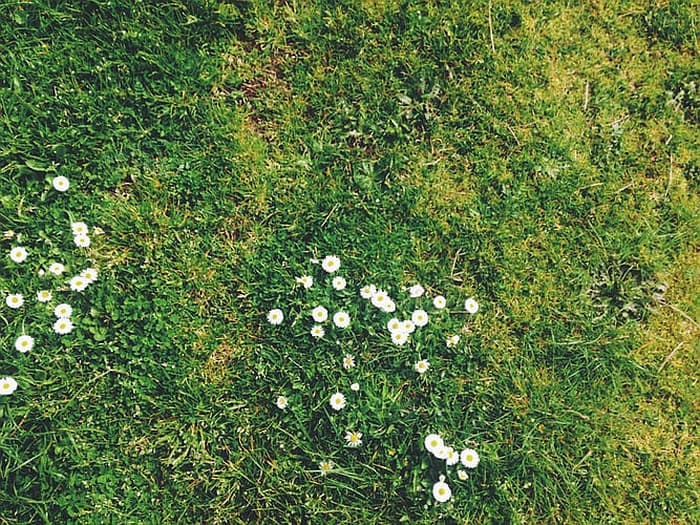
Check Weather
If you choose to apply Weed and Feed before rain, you should first check the weather forecast. If the schedule says there will be a heavy downpour within the next two days, you should postpone and wait for drier conditions. Otherwise, the heavy rain could wash away the product.
Avoid Heavy Downpours
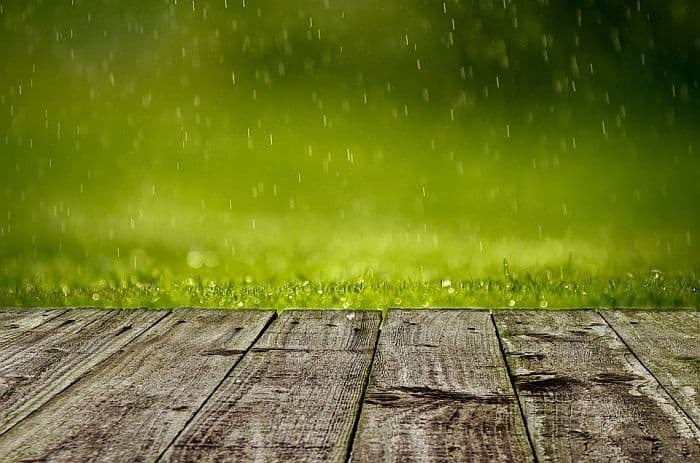
If your weather forecast suggests there might be very light showers, you might be able to get away with applying your Weed and Feed. However, you should remember that predictions are never 100 percent accurate, and you risk that there may be heavier rains than predicted.
Proceed With Caution
Once you decide to go ahead, you can follow the instructions in the next section for how to apply Weed and Feed.
How To Apply Weed And Feed After Rain
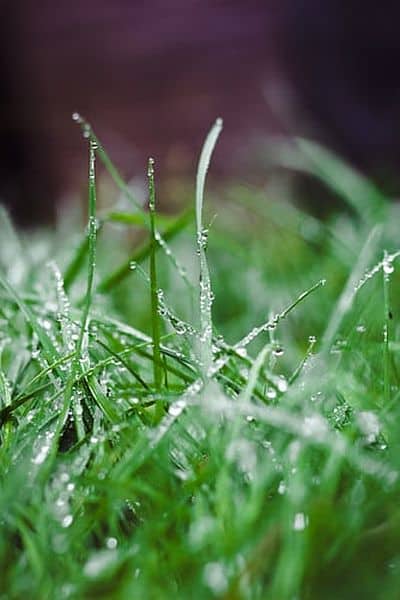
Wait Until Grass Dries A Bit
After there is rain, wait until the grass dries a little. You want the turf and soil to be damp but not completely soaked because otherwise the Weed and Feed may not adhere correctly.
Mow Your Lawn
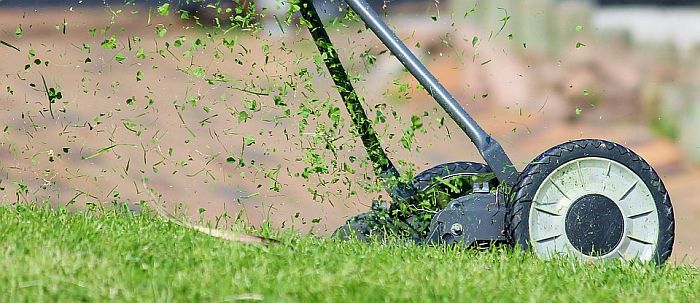
If your lawn is very tall, you may need to cut it first. Ideally, you want a height of no more than 3-5 inches (7.6-12.7cm), or else the Weed and Feed may never get through to the roots. However, if you do mow your lawn, you should wait an additional two days before applying the product.
Wear PPE
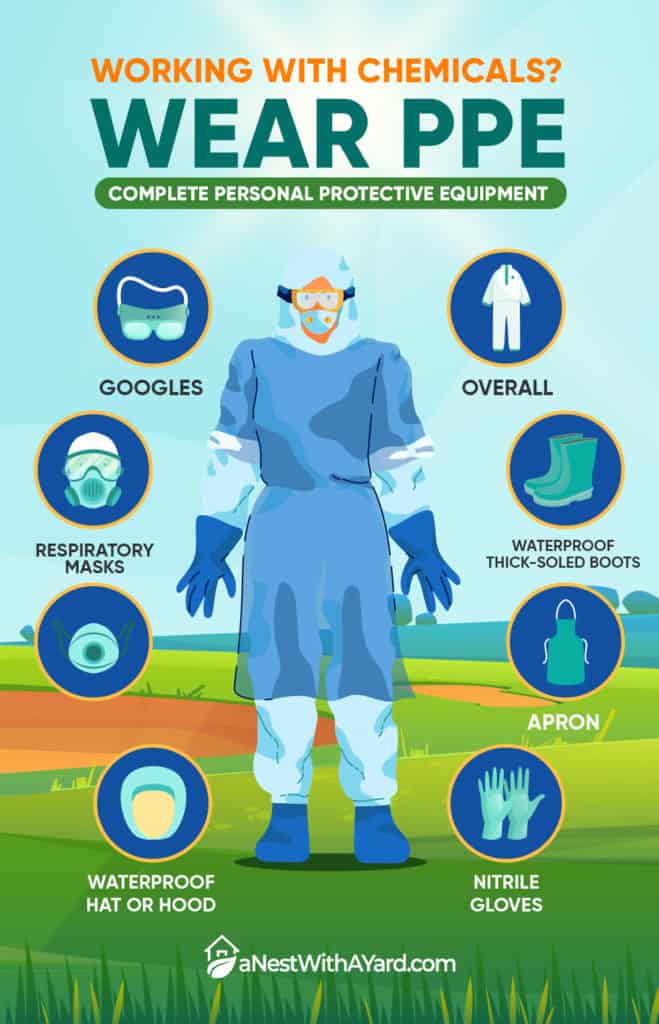
Before applying your Weed and Feed, make sure to put on appropriate personal protective equipment (PPE). You should wear long sleeves, pants, and gloves to prevent the chemicals from touching your skin. You may also like to wear a respirator and safety glasses to protect your lungs and eyes from liquid vapor.
Make sure that your children and animals are not outside and they will need to avoid being on the lawn for two days after applying Weed and Feed.
Use Broadcast Spreader For Granules
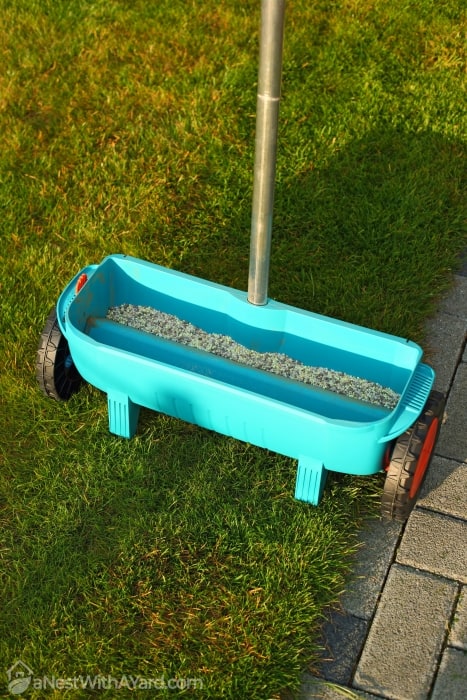
How you apply the Weed and Feed will depend on whether you have a liquid or granular formula. If you have granules, you can use a broadcast spreader to create an even layer over your turf. Make sure that you go in both directions and cover the entire space.
Use Sprayer For Liquid
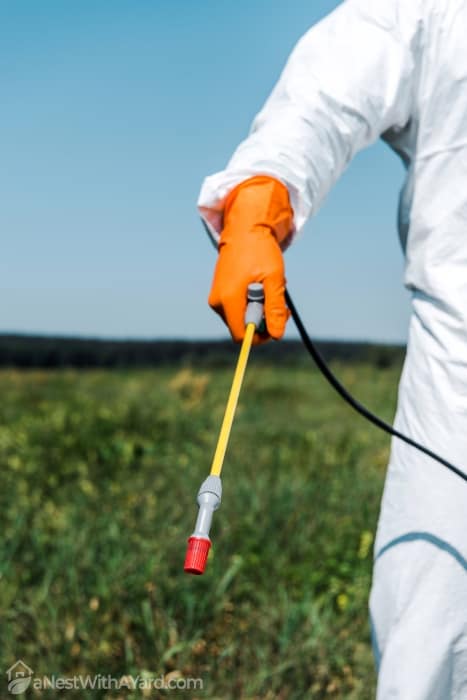
If you have liquid Weed and Feed, you will need to use a sprayer to cover the lawn. Make sure to spray in sweeping movements so that you can cover the entire area.
Wait To Water
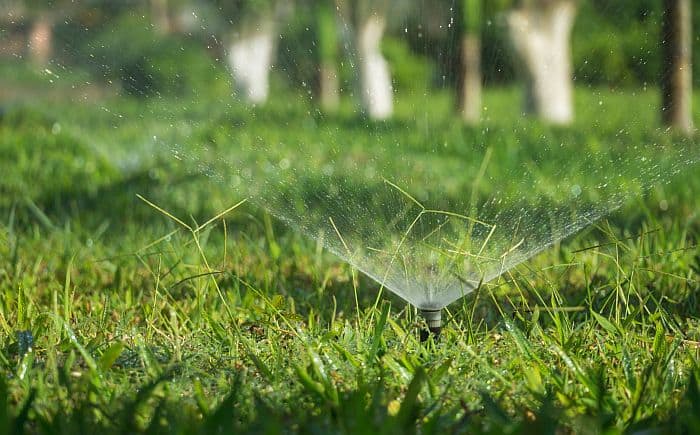
After you apply the Weed and Feed, you should wait two days before adding any water to your lawn. This gives the chemicals plenty of time to start working. You will also need to wait around four weeks if you want to plant more grass.
Note: You should apply Weed and Feed only twice a year and try to avoid over-applying it. Check your packaging to see the correct amount for your chosen brand. If you use too much of it or too frequently, you can damage your lawn.
The following video will walk you through the process of applying Weed and Feed.
FAQs
How Long Does Herbicide Need To Be On Before Rain?
Some herbicides need to be on your weeds or plants for at least 30-60 minutes before it rains. This allows the chemicals to start killing the plants before the water washes them away. However, if you can leave the herbicide on for two days, it can be even more effective.
Is It OK To Fertilize Before It Rains?
You can fertilize before it rains, but heavier downpours may wash it away. Therefore, it is better to fertilize before light showers or to wait for drier weather conditions. By doing so, you give the fertilizer enough time to penetrate the soil and benefit your plants.
What Happens If It Rains After Fertilizing?
It is usually beneficial if it rains after fertilizing. The moisture helps activate the active ingredients and allows them to penetrate the soil and benefit plant roots. However, very heavy rains may wash away the fertilizer entirely, and you will have to reapply it.
Is It Better To Fertilize Before Or After Rain?
It is generally better to fertilize a few days before rain or after it has passed. If you fertilize before, it gives the fertilizer time to work and doesn't risk washing it away. Fertilizing after rain eliminates the risk of it running off, but you will need to water it.
Will Fertilizer Burn Grass If Not Watered?
Many fertilizers can burn grass if you don't water them off. Fertilizer can cause leaf burn and dry out the soil with excess salt, killing the grass. The risk of fertilizer burning your lawn increases with temperature, especially over 85℉ (29.4℃).
Is It OK To Put Fertilizer On Wet Grass?
You can apply liquid fertilizer to wet or dry grass. You should avoid soaked grass, but a damp surface can help fertilizer to start working. However, you should only put granular fertilizer on dry grass. Otherwise, it can begin to burn the lawn and kill it.
Using Weed And Feed Before Rain Or After Rain: The Verdict
In conclusion, it is better to use Weed and Feed after rain. The moist soil can help the plants uptake the nutrients in the fertilizer part. Waiting prevents heavy rains from flooding your lawn and removing the chemicals.
However, you can also use Weed and Feed before rain if you plan at least two days in advance. This gives the active ingredients enough time to start working before rain washes them away.
If you have any further questions about when to use Weed and Feed, please feel free to drop them in the comments. Thanks for reading!
Last update on 2022-10-05 at 08:39 / Affiliate links / Images from Amazon Product Advertising API
paigequincluddeas.blogspot.com
Source: https://anestwithayard.com/weed-and-feed-before-rain/
0 Response to "When to Put Down Weed and Feed South Texas"
Post a Comment